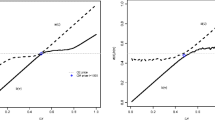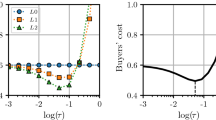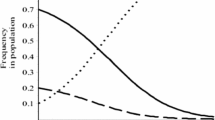Abstract
We present a novel market-based method, inspired by retail markets, for resource allocation in fully decentralised systems where agents are self-interested. Our market mechanism requires no coordinating node or complex negotiation. The stability of outcome allocations, those at equilibrium, is analysed and compared for three buyer behaviour models. In order to capture the interaction between self-interested agents, we propose the use of competitive coevolution. Our approach is both highly scalable and may be tuned to achieve specified outcome resource allocations. We demonstrate the behaviour of our approach in simulation, where evolutionary market agents act on behalf of service providing nodes to adaptively price their resources over time, in response to market conditions. We show that this leads the system to the predicted outcome resource allocation. Furthermore, the system remains stable in the presence of small changes in price, when buyers’ decision functions degrade gracefully.
Similar content being viewed by others
References
Alfano, R., & Caprio, G. D. (2006). TURBO: An autonomous execution environment with scalability and load balancing features. In Proceedings of the IEEE workshop on distributed intelligent systems: Collective intelligence and its applications (DISG06) (pp. 377–382).
Anderson E. J., Cau T. D. H. (2009) Modeling implicit collusion using coevolution. Operations Research 57(2): 439–455
Ardaiz O., Artigas P., Eymann T., Freitag F., Navarro L., Reinicke M. (2006) The catallaxy approach for decentralized economic-based allocation in grid resource and service markets. Applied Intelligence 25(2): 131–145
Axelrod R. (1987) The evolution of strategies in the iterated prisoners dilemma. In: Davis L. (eds) Genetic algorithms and simulated annealing. Pittman, London, pp 32–41
Brewer E. A. (2001) Lessons from giant-scale services. IEEE Internet Computing 5(4): 46–55
Bridgewater, J. S. A., Boykin, P. O., & Roychowdhury, V. P. (2007). Balanced overlay networks (BON): An overlay technology for decentralized load balancing. IEEE transactions on parallel and distributed systems (pp. 1122–1133).
Buyya R., Abramson D., Giddy J., Stockinger H. (2002) Economic models for resource management and scheduling in grid computing. Concurrency and Computation: Practice and Experience 14(13–15): 1507–1542
Byde, A. (2003). Applying evolutionary game theory to auction mechanism design. In IEEE international conference on e-commerce (pp. 347–354).
Cao J., Spooner D. P., Jarvis S. A., Nudd G. R. (2005) Grid load balancing using intelligent agents. Future Generation Computer Systems 21(1): 135–149
Cardellini V., Colajanni M., Yu P. S. (1999) Dynamic load balancing on web server systems. IEEE Internet Computing 3(3): 28–39
Casavant T. L., Kuhl J. G. (1988) A taxonomy of scheduling in general-purpose distributed computing systems. IEEE Transactions on Software Engineering 14(2): 141–154
Chang R., Guo M., Lin H. (2008) A multiple parallel download scheme with server throughput and client bandwidth considerations for data grids. Future Generation Computer Systems 24(8): 798–805
Chavez, A., Moukas, A., & Maes, P. (1997). Challenger: A multi-agent system for distributed resource allocation. In Proceedings of the first international conference on autonomous agents.
Clearwater, S. H. (Ed.). (1996). Market-based control: A paradigm for distributed resource allocation. Singapore: World Scientific.
Cliff D. (2003) Explorations in evolutionary design of online auction market mechanisms. Journal of Electronic Commerce Research and Applications 2(2): 162–175
Cliff, D., & Bruten, J. (1998). Simple bargaining agents for decentralized market-based control. Tech. Rep. HPL-98-17. Bristol, UK: HP Laboratories.
Cliff, D., & Bruten, J. (1998). Shop til you drop I: Market trading interactions as adaptive behavior. Tech. Rep. HPL-98-58. Bristol, UK: HP Labs.
Eiben A. E., Smith J. E. (2003) Introduction to evolutionary computing. Springer, Heidelberg
Esteva, M., & Padget, J. (2000). Auctions without auctioneers: Distributed auction protocols. In Lecture notes in artificial intelligence (vol. 1788, chap. II, pp. 20–28). Berlin, Germany: Springer.
Eugster P., Guerraoui R., Kermarrec A., Massoulie L. (2004) Epidemic information disseation in distributed systems. Computer 37(5): 60–67
Eymann, T. (2001). Co-evolution of bargaining strategies in a decentralized multi-agent system. In AAAI fall 2001 symposium on negotiation methods for autonomous cooperative systems.
Eymann, T., Padovan, B., & Schoder, D. (2000). The catallaxy as a new paradigm for the design of information systems. In Proceedings of the 16th world computer congress of the international federation for information processing.
Eymann, T., Reinicke, M., Ardaiz, O., Artigas, P., de Cerio, F., Freitag, L. D., et al. (2004). Decentralized vs. centralized economic coordination of resource allocation in grids. Lecture Notes in Computer Science 9–16.
Eymann, T., Reinickke, M., Ardaiz, O., Artigas, P., Freitag, F., & Navarro, L. (2003). Self-organizing resource allocation for autonomic networks. In Database and expert systems applications, 2003. Proceedings of the 14th international workshop on (pp. 656–660).
Gjerstad S., Dickhaut J. (1998) Price formation in double auctions. Games and Economic Behavior 22(1): 1–29
Greenwalt A. R., Kephart J. O. (1999) Shopbots and pricebots. Proceedings of the Sixteenth International Joint Conference on Artificial Intelligence 1: 506–511
Gupta A., Stahl D. O., Whinston A. B. (1999) The economics of network management. Communications of the ACM 42(9): 57–63
Hausheer, D., & Stiller, B. (2005). Peermart: The technology for a distributed auction-based market for peer-to-peer services. In Proceedings of the IEEE international conference on communications (vol. 3, pp. 1583–1587).
He M., Jennings N. R., Leung H. F. (2003) On agent-mediated electronic commerce. IEEE Transactions on Knowledge and Data Engineering 15(4): 985–1003
Jagannathan S., Almeroth K. C. (2002) Price issues in delivering e-content on-demand. ACM SIGecom Exchanges 3(2): 18–27
Ketcham J., Smith V. L., Williams A. W. (1984) A comparison of posted-offer and double-auction pricing institutions. The Review of Economic Studies 51(4): 595–614
Khan, S. U., & Ahmad, I. (2006). Non-cooperative, semi-cooperative, and cooperative games-based grid resource allocation. In 20th international parallel and distributed processing symposium (p. 10).
Kikuchi, H., Hotta, S., Abe, K., & Nakanishi, S. (2000). Distributed auction servers resolving winner and winning bid without revealing privacy of bids. In Proceedings of the seventh international conference on parallel and distributed systems: Workshops (p. 307). Washington, DC, USA: IEEE Computer Society
Kuwabara K., Ishida T., Nishibe Y., Suda T. (1996) An equilibratory market-based approach for distributed resource allocation and its applications to communication network control. In: Clearwater S. H. (eds) Market-based control: A paradigm for distributed resource allocation. World Scientific, Singapore, pp 53–73
Lai K. (2005) Markets are dead, long live markets. ACM SIGecom Exchanges 5(4): 1–10
Lewis, P. R., Marrow, P., & Yao, X. (2008). Evolutionary market agents for resource allocation in decentralised systems. In Parallel problem solving from nature—PPSN X, Lecture Notes in Computer Science (vol. 5199, pp. 1071–1080). New York: Springer.
Lewis, P. R., Marrow, P., & Yao, X. (2009). Evolutionary market agents and heterogeneous service providers: Achieving desired resource allocations. In Proceedings of the IEEE congress on evolutionary computation (pp. 904–910).
Mas-Colell A., Whinston M. D., Green J. R. (1995) Micro-economic theory. Oxford University Press, Oxford
Niu, J., Cai, K., Parsons, S., Gerding, E., McBurney, P., Moyaux, T., et al. (2008). JCAT: A platform for the TAC market design competition. In Proceedings of the 7th international joint conference on autonomous agents and multiagent systems: Demo papers (pp. 1649–1650). International Foundation for Autonomous Agents and Multiagent Systems.
Papazoglou, M. P., Traverso, P., Dustdar, S., & Leymann, F. (2006). Service-oriented computing: Research roadmap. http://infolab.uvt.nl/pub/papazogloump-2006-96.pdf. Accessed January 2009
Phelps S., McBurney P., Parsons S., Sklar E. (2002) Co-evolutionary auction mechanism design: A preliminary report. Lecture Notes in Computer Science 2531: 123–142
Phelps, S., Parsons, S. D., & McBurney, P. (2004). An evolutionary game-theoretic comparision of two double-auction market designs. In Proceedings of the 6th workshop on agent mediated electronic commerce. New York, NY, USA.
Plott C. R., Smith V. L. (1978) An experimental examination of two exchange institutions. The Review of Economic Studies 45: 133–153
Price T. C. (1997) Using co-evolutionary programming to simulate strategic behaviour in markets. Journal of Evolutionary Economics 7(3): 219–254
Ramasubramanian, V., & Sirer, E. G. (2005). Perils of transitive trust in the domain name system. Tech. Rep. TR2005-1994, Ithaca, New York, USA: Cornell University.
Ratnasamy, S., Francis, P., Handley, M., Karp, R., & Schenker, S. (2001). A scalable content-addressable network. In Proceedings of the 2001 SIGCOMM conference (vol. 31, pp. 161–172).
Ripeanu, M., & Foster, I. (2001). Peer-to-peer architecture case study: Gnutella network. In Proceedings of international conference on peer-to-peer computing (vol. 101).
Rodriguez P., Biersack E. W. (2002) Dynamic parallel access to replicated content in the internet. IEEE/ACM Transactions on Networking 10(4): 455–465
Roth A. E., Erev I. (1995) Learning in extensive-form games: Experimental data and simple dynamic models in the intermediate term. Games and economic behavior 8(1): 164–212
Singh M. P., Huhns M. N. (2005) Service-oriented computing: Semantics, processes, agents. Wiley, Chichester, West Sussex
Son Y. S., Baldick R. (2004) Hybrid coevolutionary programming for nash equilibrium search in games with local optima. IEEE Transactions on Evolutionary Computation 8(4): 305–315
Surana S., Godfrey B., Lakshminarayanan K., Karp R., Stoica I. (2006) Load balancing in dynamic structured peer-to-peer systems. Performance Evaluation 63(3): 217–240
Tesfatsion L., Judd K. (2006) Handbook of computational economics. Elsevier, Amsterdam
Waldspurger C., Hogg T., Huberman B., Kephart J., Stornetta W. (1992) Spawn: A distributed computational economy. IEEE Transactions on Software Engineering 18(2): 103–117
Walia, V., Byde, A., & Cliff, D. (2003). Evolving market design in zero-intelligence trader markets. In Proceedings of the IEEE international conference on e-commerce (pp. 157–163). IEEE Computer Society.
Wolski R., Plank J., Brevik J., Bryan T. (2001) Analyzing market-based resource allocation strategies for the computational grid. International Journal of High Performance Computing Applications 15(3): 258
Xiao, L., Zhu, Y., Ni, L. M., & Xu, Z. (2005). GridIS: An incentive-based grid scheduling. In Proceedings of the 19th IEEE international parallel and distributed processing symposium (p. 65b).
Author information
Authors and Affiliations
Corresponding author
Rights and permissions
About this article
Cite this article
Lewis, P.R., Marrow, P. & Yao, X. Resource allocation in decentralised computational systems: an evolutionary market-based approach. Auton Agent Multi-Agent Syst 21, 143–171 (2010). https://doi.org/10.1007/s10458-009-9113-x
Published:
Issue Date:
DOI: https://doi.org/10.1007/s10458-009-9113-x




